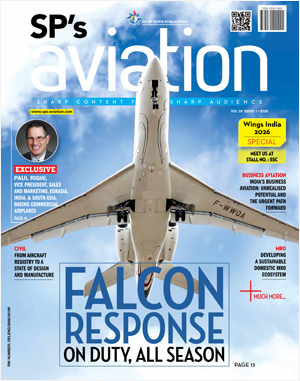INDIAN ARMED FORCES CHIEFS ON OUR RELENTLESS AND FOCUSED PUBLISHING EFFORTS

The insightful articles, inspiring narrations and analytical perspectives presented by the Editorial Team, establish an alluring connect with the reader. My compliments and best wishes to SP Guide Publications.

"Over the past 60 years, the growth of SP Guide Publications has mirrored the rising stature of Indian Navy. Its well-researched and informative magazines on Defence and Aerospace sector have served to shape an educated opinion of our military personnel, policy makers and the public alike. I wish SP's Publication team continued success, fair winds and following seas in all future endeavour!"

Since, its inception in 1964, SP Guide Publications has consistently demonstrated commitment to high-quality journalism in the aerospace and defence sectors, earning a well-deserved reputation as Asia's largest media house in this domain. I wish SP Guide Publications continued success in its pursuit of excellence.
- A leap in Indian aviation: Prime Minister Modi inaugurates Safran's Global MRO Hub in Hyderabad, Calls It a Milestone
- All about HAMMER Smart Precision Guided Weapon in India — “BEL-Safran Collaboration”
- India, Germany deepen defence ties as High Defence Committee charts ambitious plan
- True strategic autonomy will come only when our code is as indigenous as our hardware: Rajnath Singh
- EXCLUSIVE: Manish Kumar Jha speaks with Air Marshal Ashutosh Dixit, Chief of Integrated Defence Staff (CISC) at Headquarters, Integrated Defence Staff (IDS)
- Experts Speak: G20 Summit: A Sign of Global Fracture
Is All Well?

During Putin’s recent visit to India, some major agreements were signed and milestones reached. Based on their mutual strategic congruence, India and Russia have extended their decade old “long-term military and technical agreement” for another ten years
The Russian Prime Minister Vladimir Putin’s recent visit to India—the fifth in a decade, may not have concluded with the joyful raising of toasts, but the fact that the Indo-Russian strategic partnership has not only withstood the test of time but also remains firmly cemented, was evident.
Nurtured carefully over several decades, the 1971 Indo-Soviet Treaty of Peace, Friendship and Cooperation came to a straining point of break-up with the collapse of the Soviet Union in 1991. The drift in the relationship was finally halted in 2000 with the replacement of President Boris Yeltsin by Putin which brought to the helm of affairs in Russia a new leadership that understood the strategic importance of an Indo-Russian relationship. Russia was aware that unlike the West, India had not tried to humiliate Russia when it was weak. Putin not only revived the sagging relationship, but also provided further impetus in the new millennium. Even though the heady days of cheap credit are over, oil flows have stopped, and the rouble-rupee trade discontinued, both countries have once again begun to understand the relevance of their respective national priorities. In today’s complex and labile geo-political situation, both countries have wisely diversified their foreign policy options and have not diluted the mutual trust and confidence built up over decades.
The strategic partnership between Russia and India is based on collaboration in the areas of defence, space, nuclear energy, and hydrocarbons. Though apparently biased in favour of Russia in respect of bilateral trade, in reality the partnership is beneficial for India as it would help develop self-reliance in high-end dual-use technologies. Strategic bonds between the two nations are strongest in the regime of defence-related hardware. Indian assistance to the fund-starved Russian defence industry in the mid-1990s by way of massive procurement of hardware for the three wings of its armed forces, be it Su-30MKI air dominance fighters, T-90 tanks or naval vessels, is not lost on the Russian top leaders. India has been picking up as much as 25-30 per cent of Russia’s exports of defence related equipment. This has inspired Russia to offer to India the latest technology which is not available from the West, which includes even the futuristic fifth generation fighters and nuclear submarines.
During Putin’s March 2010 visit to India, some major agreements were signed and milestones reached. Based on their mutual strategic congruence, India and Russia have extended their decade-old “long-term military and technical agreement” for another ten years i.e. from 2011 to 2020. In the field of nuclear power generation, Moscow and New Delhi signed two documents; ‘A broad agreement on cooperation in the use of atomic energy for peaceful purposes’ and ‘A specific roadmap for the serial construction of Russian designed nuclear power plants in India’. As part of this agreement, Russia will add four reactors to the existing two at Kudankulam in Tamil Nadu and develop another reactor site at Haripur in West Bengal.





